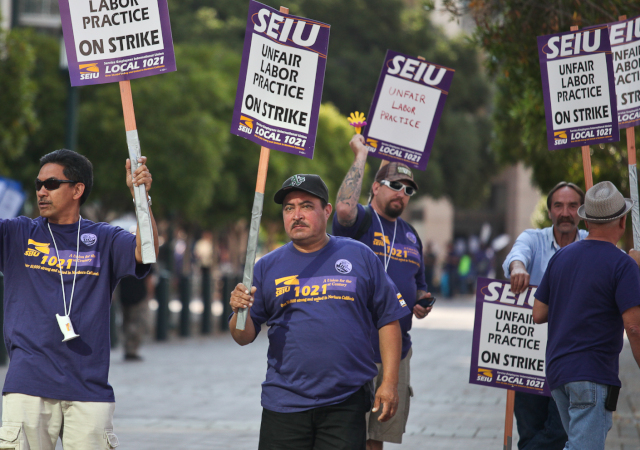Keep in mind the info does not include health and pension benefits.
Bay Area News Group says it will keep updating the page as new contracts are proposed.
The data shows employees from the two striking unions make around $78,000 to $81,000, including overtime.
The U.S. Census Bureau said the 2010 median household income in San Francisco was $71,745, or $76,644 in 2013 inflation-adjusted dollars. In Marin it was $83,867 ($89,593); Alameda County $67,169 ($71,755); Contra Costa $83,867 ($89,593); San Mateo County $82,745 ($88,395).
Here's a report by NBC Bay Area Monday night examining the specifics of what the unions have been asking for and what BART has offered.
And if you're interested in public employee pay, the Sacramento Bee has posted salary information for state workers, sorted by bargaining unit.
The dispute
BART workers have not had a raise in five years. They say that they have taken a hit during the financial crisis, which decimated government coffers, and now they are trying to make that up. Management, meanwhile, is more concerned with having employees contribute to rising health care and pension costs. Workers pay $92 per month for health insurance, regardless of how many dependents are on the plan. They do not contribute to their pensions, and they do not receive social security benefits.
On KQED Radio's "Forum" program on Monday, Randy Rentschler, director of legislation and public affairs for the Metropolitan Transportation Commission (MTC), said that the dispute between BART employees and management is part of a larger conflict going on between public workers and governments.
"Over time, public agencies have sought to protect their workers from increasing health care costs that have really snarled our economy for decades," he said. "I think that both sides are really stuck in this kind of national issue of rising health care costs, pensions that are difficult; and you can see that those are the two sticking points. .... Whether or not the two sides can find a middle ground on that subject is still an open question."
San Francisco Chronicle political columnist Phil Matier agrees. He said on KCBS Monday ...
The bottom line (if) you listen to both sides, is that this is not just about BART — it’s about all the municipal unions. These public employees feel like they have been furloughed and they have been dealt spending cuts repeatedly over the years. With the economy on the mend, the money is coming back and the boards of directors are finding other ways to spend it because they say there are other needs. Union leaders, I don’t think, can sell the membership a package that continues to what appears to be a net loss—whether it’s the city of Oakland, BART, or any public service.
Alicia Trost, spokeswoman for BART, said on the "Forum" show that the agency is "trying to figure out a balance between investing in our employees and investing in our system."
"We’re hoping the strike allows our employees to let off some steam," she said. "Maybe that’ll help get us back to the table and come up with a reasonable compromise."
Josie Mooney, chief negotiator for SEIU 1021, said that what BART characterized as an offer of a wage increase really amounted to no net benefit for workers.
"If I give you a quarter in Paragraph 1 and then I take it away in Paragraph 2, that still amounts to zero," she said. "So while BART management has put a 5 percent raise on Page 1 ... they've taken it away on Page 4." Mooney said that means the gains in salary that workers would win under BART's proposal would be effectively nullified by a requirement that workers contribute an equivalent amount to their pensions. Citing "millions of dollars of surplus," Mooney said that BART's offer does not acknowledge that "the system is in great shape" and that "ridership is up."
BART's Alicia Trost, however, said, "We don't have a surplus. We have a tremendous unfunded capital need." She said in coming years, BART wants to buy 1,000 new train cars and a new train-control system, costs to which the agency will have to contribute 25 percent.
